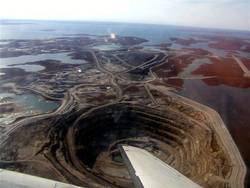 |
|
|
The very idea of mining in Arctic regions is highly controversial, as it would mean changing one of the last places on earth untouched by humans, risking delicate ecosystems that are already being Millions of years ago, the land under the North Pole was a tropical forest - perfect conditions for the creation of fossil fuels. When "easy to mine" oil and gas become harder to find, the pressure mounts to look in more difficult, extreme environments, such as the Arctic. But in any extreme environment, the risks of accidents and the difficulties of cleaning up any spills become very much harder to control. In 1989, the Exxon Valdez tanker ran aground in Prince William Sound, Alaska, causing a local ecological disaster. Oil from that incident can still be found on the beaches there over The Arctic seas are only relatively calm for a short period in summer each year. Outside of these times, the sea is too rough for drilling rigs to safely work without great risks to human safety and of spillage.
|



What's your opinion?
Average rating




Not yet rated